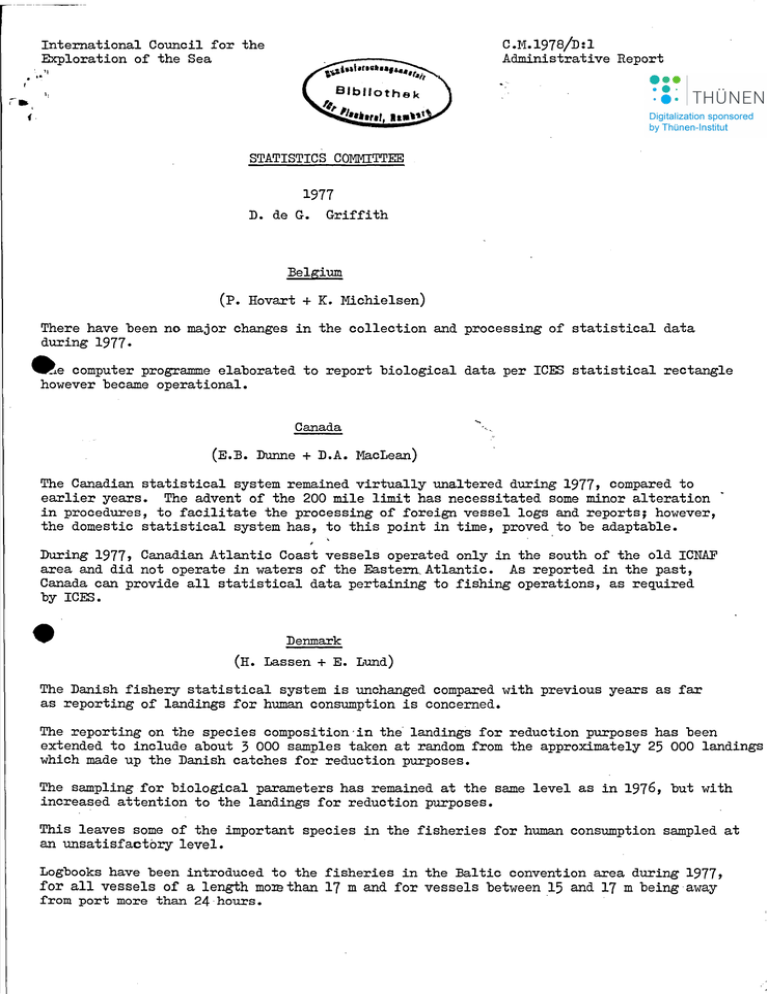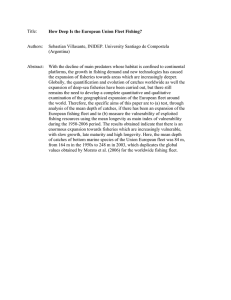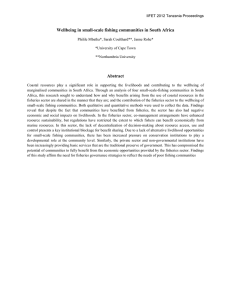.
advertisement

International Council for the Exploration of the Sea . ,. C.M.1978/D:l Administrative Report 'I . . (. STATISTICS COMMITTEE 1977 D. de G. Griffith Belgium (P. Hovart + K. Michielsen) There have been no major changes in the collection and processing of statistical data during 1977. ~e computer programme elaborated to report biological data per ICES statistical rectangle however became operational. Canada (E.B. Dunne + D.A. MacLean) The Canadian statistical system remained virtually unaltered during 1977, compared to earlier years. The advent of the 200 mile limit has necessitated some minor alteration in procedures, to facilitate the processing of foreign vessel logs and reports; however, the domestic statistical system has, to this point in time, proved,to be adaptable. During 1977, Canadian Atlantic Coast vessels operated only in the south of the eld ICNAF area and did not operate in waters of the Eastern, Atlantic. As reported in the past, Canada can provide all statistical data pertaining to fishing operations, as required by ICES. Denmark (H. Lassen + E. Lund) The Danish fishery statistical system is unchanged compared with previous years as far as reporting of landings for human consumption is concerned. The reporting on the species composition'in the' landings for reduction purposes has been extended to include about 3 000 samples taken at random from the approximately 25 000 landings which made up the Danish catches for reduction purposes. The sampling for biological parameters has remained at the same level as in 1976, but with increased attention to the landings for reduction purposes. This leaves some of the important species in the fisheries for human consumption sampled at an unsatisfactory level. Logbooks have been introduced to the fisheries in the Baltic convention area during 1977, fer all vesse1s ef a 1ength mOIethan 17 m and fer vessels between 15 and 11 m beingaway from port more than 24hours. . - 2 - The present statistical system has been investigated during 1977 with a view to possible ADP treatment in the future. Logbooks will be obligatory from 1978 onwards and there will be increased attention to both the biological sampling as well as the sampling for nominal catches. Finland (A. Rantala) There were no principal changes in our fishing data collecting and processing methods during1977. The fishing data, collected by the Fisheries Division of Finnish Game and Fisheries Research Institute, are divided into four categories : 1. Data from fishermen fishing with vessels with an overall length of more than 15 m, reporting their fishing for every fishing effort; 2. mIonthly fishing data from other sea:Tis:/iermen; 3. fishing data from freshwater fishermen reporting their vendace fishing monthly and all their other fishing only yearly; 4. fishing data from non-professional fishermen whose fishing is surveyed at intervals of a few years, the most recent having been in 1975. In the near future, we will be trying to improve our data collecting methods to make it possible to estimate fishing effort data for freshwater species in·~he sea areas. France No report received. German Democratic Republic (B. Schreiber + B. Vaske) There have been no major changes in the collection and processing of statistical data during 1977. Germany, Federal Republic of (A. Schumacher + G. Wagner) The system of collection and processing of fishery statistics in the German (F.R.) deep sea trawler fishery has been described in 1973 (C.~1973/D:6). During 1977, no essential change took place. In 1975, a new logbook system for the cutter fishery on voluntary basis was introduced and became ob1igatory as of 1.7.1977 for boats more than 17 m lang and at sea far langer than ane day. The new 1aw does not app1y to boats fishing for shrimps or mussels. \ \ • - 3- . , • Analysis of the reports shows that atpresent nearly 80% of cutterlandings recorded in the ports of the Ealtic and the North Sea are covered by the new logbook system• During 1978," the' reporting rate is expected to improve considerably. The weight of the estimated catches reported in the logbooks differ from the landed weight only by about 5%. lceland (J. Elöndal + M. Elisson) 1977 passed without any significant changes in the lcelandic statistical system. Earlier plans regarding the computerisation of logbook datawere postponed, the reason being the renewal of computer equipment signifying a different approach to system construction. This new equipment is scheduled to be operative by autumn 1978. . • Ireland (n. de G. Gri~~ith) No signi~icant changes were made in the lrish fisheries statistics system during 1977. Netherlands (H.E. Eecker + Th. J. Tienstra) Compared to 1976, no signi~icant changes were made in the Netherlands ~isheries statistics system. As mentioned in the 1976 Administrative Report, a working group is looking into the system. Proposals ~or improvements within the existing system or a possible new design have not been made up to now. Norway (P. Mietle + 0. Ulltang) There were no essential changes in the Norwegian data collecting and reporting system during the year 1977. However, the extensions to 200 miles economic zones have increased the requirement ~or more detailed and accurate catch reporting. To meet these requirements, we have attempted to make the existing system more per~ect and e~~icient. This work will be carried on in 1978 and our reporting to lCES will obviously bene~it ~rom it. Poland (A. Ropelewski) There have been no changes in the collection and processing o~ statistical data during 1977. A computer programme is now being e1aborated to report biostatistica1 data per leES and ICNAF statistical units. It is hoped that such data will be available from the year 1979. - 4 Portugal No report received. Spain No report received. Sweden (R. Lind + E. Lindfors) The data collection for sea fisheries based upon a new type of logbook kept on board all sea-going fishing vessels of 12 m length and above started on 1 July 1911. From 1 January 1978 also smaller vessels in sea fisheries will be included. From 1 January 1918 fishing by foreign vessels in the Swedish fishery zone of the Ealtic is reported to the Swedish coast guard and registered on line. Data processing cf these reports, and of Swedish logbook data, will be started as soonas the recently installed computer has been technically completed and relevant ADP programmes tested. • United Kingdom (A.C. Burd + J.A. Pope) Only minor changes have been made in the system of catch and effort data collection in England and Wales. The basic data processing system has remained the same, but an extensive review has taken place with a view to improving certain aspects of the system. The collection, processing and publication of Scottish Sea continued along precisely the same lines during 1971 as in Sampling of fish landings for biological purposes was also information on discards at sea was collected by scientific commercial vessels. Fisheries Statistics the period 1914-16. maintained and some observers on board U.S.A. (E. Heyerdahl + K. Paine) As in recent years, the United States did not participate in any fishing activities within the lCES area during 1917. All USA catch and effort statistics for that year are being provided to lCNAF and FAO. Statistical reporting procedures for the USA domestic fisheries remained unchanged over the requirements of 1976. However, for foreign distant-water fleets, major changes were enacted through the ~isheries conservation and management act o~ 1976. Beginning 1 March 1911, all foreign fishing activities within 200 miles of the U.S. coastline came under the jurisdiction of this legislation. Principal and by-catch species were 1imited by time, area and quota restrictions. Summary ~leet catches by species management plans were reported to the USA by two-week periods. ln'addition,individual vessel catches were required over a two-week period for each 30 x 30 minute and gear-type combination engaged in during the reporting period. These detai1ed vesse1 summaries were reported quarterly, using the formats prviously agreed to for the - 5- ICNAF statistica1 areas, through the Ooordinating Working Party forAt1amtic Fishery Statistics (CWP). These data are being processed into computer formats. U.S.S.R. (G.v. Martinsen + N.V. Yanovskaya) In 1977, there have been no changes in co11ection and processing of statistics. It is expected that in 1978 the processing of statistics will be computerised. Then it will become possib1e to present catch statistics to ICES by statistica1 rectang1es. ~ • ----------


